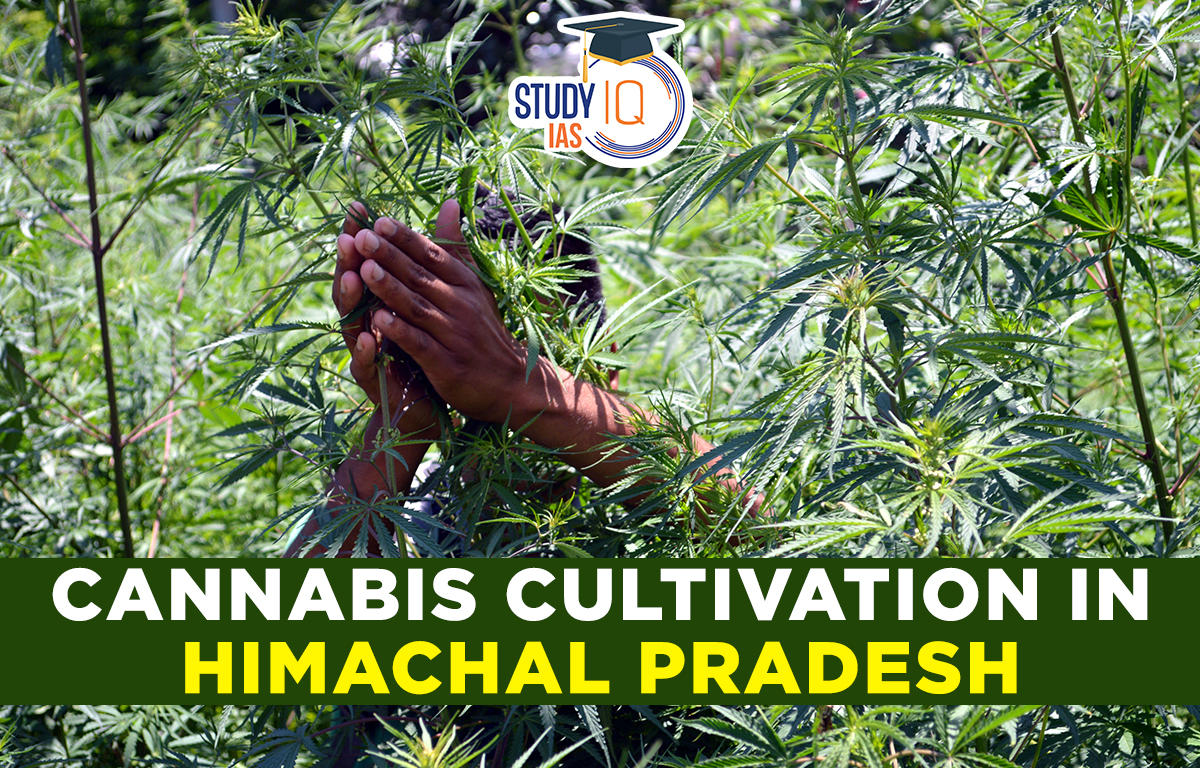Table of Contents
Context: Himachal Pradesh assembly has constituted a committee of legislators to look into legalisation of cannabis cultivation in the state.
About Cannabis
- Cannabis refers to a group of three plants with psychoactive properties, known as Cannabis sativa, Cannabis indica, and Cannabis ruderalis.
- Cannabis is made up of more than 120 components, which are known as cannabinoids. Two of them are:
- Cannabidiol (CBD): This is a psychoactive cannabinoid, yet it’s non-intoxicating and non-euphoric.
- It’s often used to help reduce inflammation and pain. It may also ease nausea, migraine, seizures and anxiety.
- Tetrahydrocannabinol (THC): This is the main psychoactive compound in cannabis. THC is responsible for the “high” that most people associate with cannabis.
- Cannabis cultivation traces all the way up to 12,000 years ago, suggesting it was one of humanity’s oldest cultivated crops.
- Traditional Drink: Some scholars speculate that it may be the main ingredient of the ritual Vedic drink ‘soma’, mentioned in both the Rigveda and the Bhagavad Gita.
- 1961 Single Convention on Narcotic Drugs: It put down stringent controls for the manufacture and consumption of drugs including cannabis.

Cannabis Cultivation in India
- India banned the cultivation of cannabis plant under the Narcotic Drugs and Psychotropic Substances (NDPS) Act.
- Currently, charas, ganja, or any mixture or drink prepared from the two products are banned in India under the NDPS Act, regardless of hemp cultivation.
- Exemption to Ban: Section 10 (a) (iii) of the Act empowers States to make rules regarding the cultivation of any cannabis plant, production, possession, transport, consumption, use, purchase, sale, and consumption of cannabis (except charas).
- States are empowered to permit, by general or special order, the cultivation of hemp, only for obtaining fibber or seeds or for horticultural purposes.
- Uttarakhand became the first State in the country to legalise cannabis cultivation in 2017 for industrial use.
- Central government has also given legal status to the cultivation of cannabis in some districts of Rajasthan, Madhya Pradesh and Uttar Pradesh.
- Controlled cultivation of cannabis has been permitted in several European Union countries apart from Uruguay, Canada, USA, Austria, Belgium and the Czech Republic.
Significance of Move
- Revenue for Government: Given India’s production capacity of cannabis, the government stands to benefit in terms of tax.
- India alone accounted for 6 percent of the world’s cannabis herb seizures in 2016 and even higher quantities in 2017.
- Rural economy: It will improve the economy in rural areas and the income of the state government will also increase.
- In parts of Himachal such as Kullu and Mandi, hemp had traditionally been used for making footwear, ropes, mats, food items, etc.
- Culinary importance: During snowfall in Himachal Pradesh, a dish is prepared from cannabis seeds to keep people warm and energetic.
- Overall benefits: The legalization of marijuana can help create jobs, battle stress, improve human concentration, resolve medical problems and provide sustainable agricultural incomes, among other things.

Concern with Cultivation of Cannabis
- Diversion: The use of cannabinoids is not a first-line therapy and could be diverted for purposes other than medical.
- Mental Health: Its use may increase the risk of developing clinical depression or exacerbate the signs of any existing mental illnesses.
- Impair Brain: It may be more difficult to concentrate, learn, and retain information by continuous use of cannabis.
- Lungs could hurt: Lungs may become swollen and itchy from its smoke.
- Newborn Could Be Underweight: Pregnant women who use cannabis run an increased risk of having underweight or preterm newborns.
Conclusion
- Cannabis availability in the market or human usage have not been stopped by prohibition or making it illegal.
- Cannabis has possible hazards, which is why it must be subject to legal regulation.
- Cannabis should be safely produced by qualified farmers, packed and tested in appropriate facilities, and sold by respectable and licenced sellers rather than being left in the hands of an unregulated criminal market.


 Space Tourism, Features, Ongoing Project...
Space Tourism, Features, Ongoing Project...
 Household Savings, Concerns About Rising...
Household Savings, Concerns About Rising...
 UPSC Final Result 2024 Released, Downloa...
UPSC Final Result 2024 Released, Downloa...

















